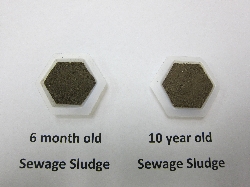5585 Guilford Road • Madison, WI 53711-5801 • 608-273-8080 • Fax 608-273-2021
www.agronomy.org
Twitter | Facebook
NEWS RELEASE
Contact: Hanna Jeske, Associate Director of Marketing and Brand Strategy, 608-268-3972, hjeske@sciencesocieties.org
Implications of Sewage Sludge
MADISON, WI, JULY 12, 2011 -- Sewage sludge has been widely applied to agricultural lands to enhance soil fertility due to its high organic matter and nutrient content. It has been considered as an economically and environmentally sound disposal alternative to landfills and incineration. However, one of the concerns of continued application of sewage sludge is the increased amounts of heavy metals deposited into the soil.

Scientists at Louisiana State University Agricultural Center have investigated the effects oxidation has on the deposits of heavy metals from sewage sludge into soils.
The status of four commonly found heavy metals (copper, zinc, arsenic and lead) in sewage sludge following the oxidation of organic matter was investigated in a laboratory study.
Results from the study were published in the July-August 2011 issue of the Journal of Environmental Quality.
The study revealed that the properties of sewage sludge have a more significant role than soil properties in terms of heavy metal deposits in the soil.
Jim Wang, the project director of the research, explained that these findings suggest the importance of managing sewage sludge properties in order to ensure these harmful metals are not released into the environment.
Research is ongoing at the Louisiana State University Agricultural Center to investigate the retention of these metals in soil as sewage sludge organic matter is degraded through the oxidation process.
###
Journal of Environmental Quality publishes original research, reviews and analyses, and environmental issue articles that address anthropogenic impacts on water, soil, and the atmosphere and pertain to some aspect of environmental quality in natural and agricultural ecosystems.